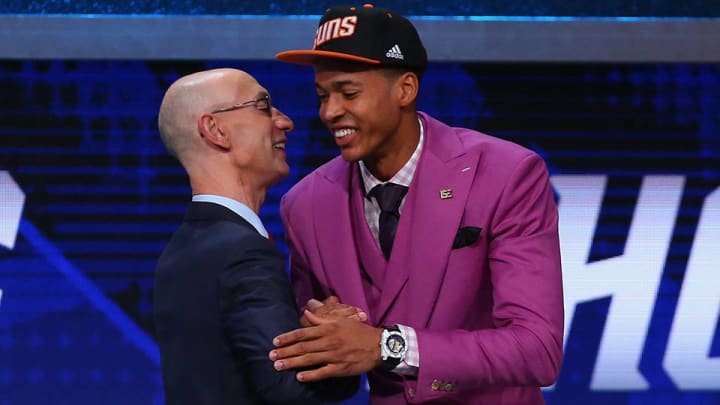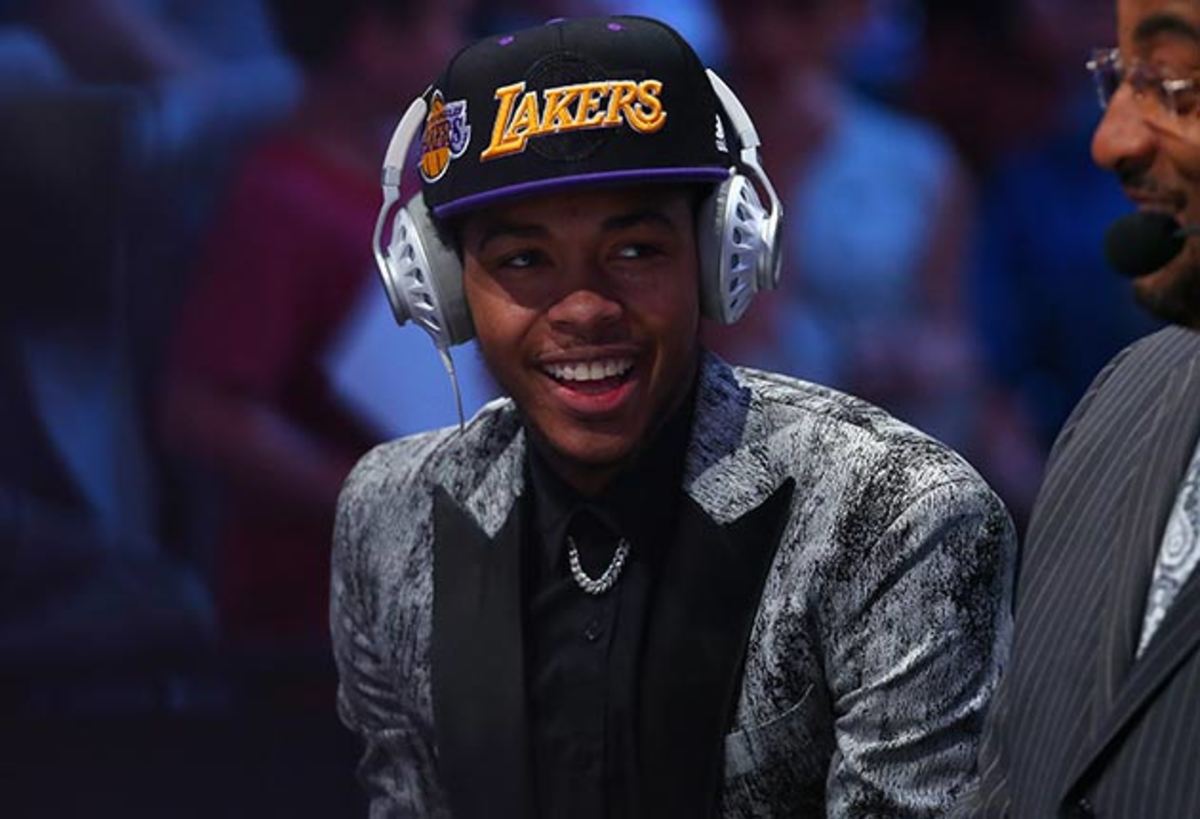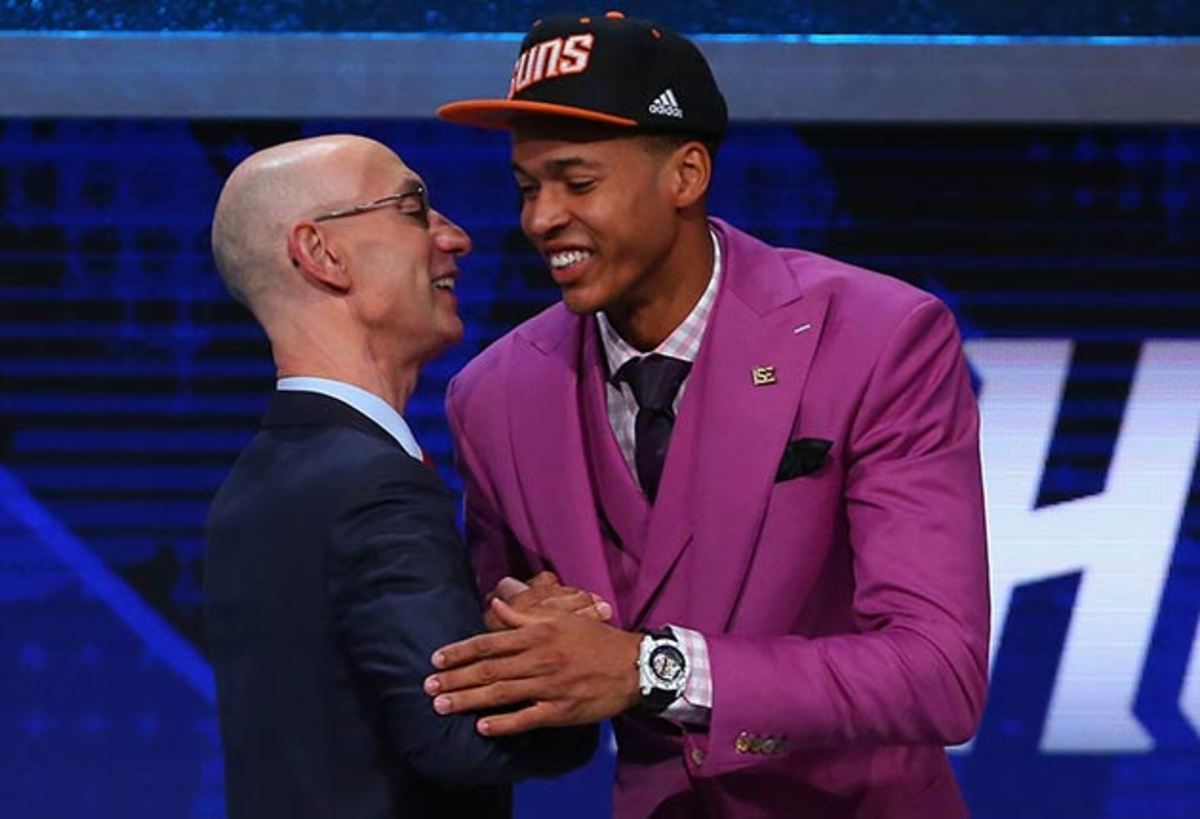NBA draft: Biggest winners and losers

Your teams. Your favorite writers. Wherever you want them. Personalize SI with our new App. Install on iOS or Android.
NEW YORK — What better time to render definitive judgments on teenagers, and the teams that have pledged to pay them millions of dollars, than months before they’ve had a chance to show what they can do in an NBA game? The future is right now: Let’s run down the biggest winners and losers from an unpredictable night at the 2016 NBA draft.
Winners: Sixers
Christmas took three full years to arrive and the wait cost former GM Sam Hinkie his job, but Sixers fans were rewarded with a great haul: the top overall talent in the draft (Ben Simmons), one of the biggest steals of the first round relative to projections (TimotheLuwawu) and a talented international guard who fills a position of major need (FurkanKorkmaz).
The new Colangelo regime made the “easy call” with Simmons, one that should drive a immediate response when it comes to ticket and jersey sales and one that, if things break right, will give Philadelphia one of the biggest matchup nightmares for years to come. To make “The Process” worth trusting, Philadelphia needed to take a shot at a player with franchise player potential. Simmons, despite the questions about his shooting and commitment at LSU, is that guy thanks to his playmaking ability and unique point forward mold.
• NBA draft team grades: Celtics resist, Bucks fail and more marks
This was a draft that the Sixers’ hardcore Internet diehards and casual fans alike could appreciate.
Losers: Kings
For about 15 minutes, Vlade Divac was on track to be a winner thanks to the multiple extra assets he received from Phoenix to move down from No. 8 to No. 13. Any goodwill went out the window though when he selected Georgios Papagiannis, a Greek center who received tepid write-ups from most of the major draft analysts and was universally viewed as a non-lottery pick.
The Kings had needs at the one, two, three and four, and yet they chose to invest their top selection at the five, where All-Star DeMarcus Cousins, back-up Kosta Koufos and 2015 lottery pick Willie Cauley-Stein were already too crowded for comfort. Cousins’ Twitter reaction—“Lord give me the strength”—said it all.
• SI.com's NBA draft tracker | Trade roundup | Pick-by-pick analysis
The public relations damage continued from there, as Malachi Richardson looked forlorn when he went off the board at No. 22 (in a pick the Kings had acquired earlier in a trade agreement with the Hornets). Maybe Richardson will come around on the Kings with some time to think about it, a la the head-desking Zach LaVine and the Timberwolves, but maybe not. For now, a franchise that desperately needed to appeared functional after years of coaching changes and management shake-ups looked like a mess once again.

Winners: Lakers
The Lakers seem to have gotten lost in the shuffle a little bit because their selection of Brandon Ingram at No. 2 was expected days in advance. Skipping past this addition would be a mistake. Ingram’s arrival is the best thing to happen to the franchise during the post–Kobe Achilles injury era, and he has a higher ceiling and more intriguing game than any of their current prospects, including 2015 lottery pick D’Angelo Russell and 2014 lottery pick Julius Randle.
Although the comparisons to Kevin Durant are unfair, Ingram should be an absolute joy to watch develop over the next 3–5 years and there should be “Wow” moments as early as next season. New Lakers coach Luke Walton should be ecstatic over Ingram’s personality, his skill level and his position fit with L.A.’s other young pieces.
Losers: Bucks
I’m a full-on Thon Maker skeptic and his selection at No. 10 deserves all of the scrutiny it received. The best defense of Milwaukee’s move is that the draft fell off noticeably around the eighth or ninth pick, making a late-lottery reach for Maker a little more understandable. I still don’t see it.
Maker’s feel for the game and all-around skillset leave a lot to be desired, and it’s hard to envision him being able to handle life as an NBA center. Given that, why invest a lottery pick in a long-term project whose best position is the same as Jabari Parker’s best position (four). While the Bucks hit big on Giannis Antetokounmpo, their track record of moves since Jason Kidd’s arrival has been highly questionable. Add this one to the list.
Winners: Celtics
The online consensus seemed to peg the Celtics as losers because they were unable to land a star like Jimmy Butler or Gordon Hayward over the past week. Others knocked the fact that Boston selected more prospects than they can reasonably play.
Newsflash: Stars don’t move very often and the Celtics were only dangling the third pick in a two-player draft. They tried to set off a bidding war, it didn’t work, and they ended up selecting a player in Jaylen Brown who has a pro’s body and significant upside. Even better, Brown fills a position of need on the wing and Boston has enough talent assembled already to allow him to develop at his own pace. Plus, big picture, this pick was gifted to the Celtics by the Nets. There’s no way that adding a top prospect, even a polarizing one like Brown, thanks to the incredibly favorable terms from a years-old trade should be viewed as a loss.
On top of that, the Nets traded away Thaddeus Young for a draft pick on Thursday, signaling a desire to pursue a traditional, long-term rebuild. That favors the Celtics, who have the right to swap picks with the Nets in the 2017 first round. There’s a very good chance that the Nets are one of the two or three worst teams in the NBA next season, giving the Celtics yet another crack at a top talent a year from now.
Losers: Magic
The Magic continue to bleed talent in questionable trades. Fresh off trading Tobias Harris and Channing Frye, Orlando parted with former lottery pick Victor Oladipo and 2016 lottery pick Domantas Sabonis to acquire Serge Ibaka from the Thunder. While Ibaka arrives as Orlando’s best player, he’s coming off a down year and is entering the final year of his contract, meaning he will need to be re–signed at a heavy price next summer. Even worse, he’s miscast as anything other than a complementary option.
• Trade grades: How did Thunder, Magic do in Ibaka-Oladipo deal?
On paper, Ibaka fits in fairly well alongside the Magic’s core guys—he can cover for Nikola Vucevic’s defense, he can space the floor to free up Elfrid Payton for drives and Aaron Gordon for paint finishes—but he’s a weird late addition to a squad that seemed to be rebuilding through youth.
Winner: Buddy Hield
From the perspective of the player, there probably isn’t a better team fit in the lottery than Buddy Hield going to the Pelicans. Hield was pegged as the draft’s best shooter and most celebrated shot-maker; he goes to a team that desperately needs both, and that can use a dose of his magnetic personality, too. After years of waiting around for Eric Gordon to get healthy and play productive basketball, the Pelicans now have an NBA-ready guard who can get buckets and who should thrive in coach Alvin Gentry’s “green light” and up-tempo style.
Hield’s skills could have been lost or overlooked in a lot of environments. In New Orleans, he should get the opportunity to play immediately and the freedom to do what he does best.

Loser: Skal Labissiere
To be clear, Skal Labissiere didn’t lose completely. Although he slid much further than many expected, he was still selected in the first-round pick and will therefore receive a guaranteed seven-figure contract. For a survivor of the 2010 earthquake in Haiti, that’s no small matter.
Labissiere isn’t even a loser for sliding. Yes, that’s embarrassing, but often slippage can resuilt in players who need development landing with quality teams who are equipped to guide their progress.
That’s not what happened here. Unfortunately, Labissiere fell to the Kings, who have a loaded frontcourt, a poor track record of developing talent, an eccentric owner and a constant changing of the guard in the front office. Not too long ago, the Kings opted to turn their D-League team into a testing ground for an ultra-fast, ultra-perimeter based approach.
• NBA draft grades: Pick-by-pick analysis of the entire first round
Does this sound like the best environment for a raw but intriguing big man to hone his game? Or, would he have been better off going to the Spurs or the Warriors (the two teams who were picking next)? Hmm.
The upside here is that Labissiere slid far enough that the Kings will be free to trade him in the relatively near future without risking too much egg on their face. Here’s hoping he has better luck finding a better home than he found at Kentucky during his shaky one-and-done season.
Winner: Dragan Bender
At just 18 years old and with unimpressive stats to his name, Dragan Bender desperately needed to land somewhere that would provide him plenty of time and minimal short-term expectations. Phoenix fits the bill on both fronts.
After a disastrous 2015-16 season, the Suns opted to hire first-time head coach Earl Watson this summer, a move that made it clear they weren’t going to obsess over a return to the playoffs in 2017. Bender should enjoy as many minutes as he can handle as a rookie for a team that generally stays off the national radar unless serious hijinks (towel throwing, marijuana arrests, etc.) are involved. Many of the other teams picking in the high lottery—especially Boston, Minnesota, and New Orleans—want to win now. Phoenix, by contrast, should make for a better place for Bender to soft launch his career.
• Special Delivery: Will Dragan Bender be NBA's next Croatian star?
Loser: Ricky Rubio
Rumors swirled for hours that the Timberwolves might have drafted Providence point guard Kris Dunn as part of a package to acquire Bulls All-Star guard Jimmy Butler. In that scenario, Butler would have joined a Timberwolves team that could have trotted out four elite or potentially elite defensive players at their respective positions (Ricky Rubio, Butler, Andrew Wiggins, Karl-Anthony Towns). For Rubio, this would have been the dream: a defensive team identity that involved him and an extra proven scoring option to compensate for his own limitations as a shooter and scorer.
Instead, the Timberwolves weren’t able to swing a deal. That leaves Dunn looking like the heir to the throne at point guard and raises serious questions about Rubio’s long-term future in Minnesota under new coach Tom Thibodeau. It’s reasonable to believe that the Timberwolves could play Rubio and Dunn together next season, as Dunn acclimates to life in the NBA and Thibodeau gets a feel for his roster. Past that, though, something will almost certainly need to give.
Rubio’s five seasons in Minnesota haven’t exactly gone according to plan, due to injuries and the many questionable decisions made by previous management regimes. It’s a bit sad to think that he might not be a part of the first Timberwolves team that finally gets over the hump and back into the playoffs.
